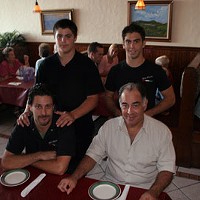Postmodern Christianity
Charlotte's emergent churches offer up double half-caf Jesus with a shot of Derrida
By Karen ShugartPage 5 of 5
"It often doesn't feel like prayer," he says after the music stops and people look at him to speak. "Because we've been taught that praying is conversation, or, in the worst-case scenario, that prayer is a checklist of things we need to do or ask God's blessings -- we need this or we need that ..." he says. "This is contemplative prayer. It's prayer that's beyond words. ... We're not conscious of words or questions or answers, we're simply opening ourselves up to be conscious of God's presence."
Emerging churches have been compared with the Jesus Movement of the 1960s, when hippies became "Jesus freaks" and attempted to adopt the theology of the early Christians to their own lifestyles. Jesus freaks were anti-materialistic, evangelistic, believed in Biblical inerrancy and exhibited a zeal for Jesus Christ. They often embraced communal living.
Leonard compares conservative Christianity's initial rejection of the Jesus Movement with how traditionalists have reacted to emergent churches today. "Many churches at first reacted against it: 'Oh, we don't want a youth minister who has long hair and a pierced ear,'" he says of '60s and '70s congregations. "Then they turned around and saw that these people were often very helpful in getting the attention of young people. So then many churches wanted a youth minister with long hair and a pierced ear."
Both movements have similar motivations, Leonard says. "They're really saying there are a lot of people who have been turned off by church, there are a lot of people who are also turned off by the methods and the size of the megachurches that seem very impersonal and seem more like show business," he says. "Well, the emerging church says, we'd rather be a friend's coffeehouse. We'd rather, instead of having the sage on the stage -- the pastor -- we'd rather have the pastor as the guide on the side; that is, we'd rather have the community as the centerpiece of worship, not just one person who's telling us what to do."
Church trends are cyclical, though, and often don't last beyond a generation or two. So will emerging churches go the way of Jesus freaks? Hofert, co-pastor at Watershed, says his church isn't intended to be simply a segue for young people into more traditional churches. "Our hope is we talk about topics that are deep enough where somebody could walk in and walk with God for a lot of years and also are relevant for first-time visitors," he says.
Billy Strickland, who's attended Watershed from the start, attended a few churches such as Warehouse 242 and South Charlotte Fellowship before finding Hofert's group. All have nontraditional worship styles, and that's the way Strickland likes it. "I heard someone say, if there were three rules that you have to follow to become a Christian, you could live by those three rules and then you'd be done with it. ... But Christ is more of a mystery. You're forced to constantly explore that mystery your entire life."
Strickland doesn't always see eye-to-eye with Watershed pastors O'Neil and Hofert, but he says that's not important: "The cool thing is, they want to keep discussing it."
Karen.shugart@creativeloafing.com
Staff writer Jared Neumark contributed to this story.
Speaking of 4.38000
-

A Place you cannot Refuse
Aug 30, 2006 -

chappelle's show: lost episodes
Aug 2, 2006 - More »
Latest in Cover
More by Karen Shugart
-
Mecklenburg and beyond ...
Feb 10, 2009 -
Mecklenburg and beyond ...
Feb 9, 2009 -
Mecklenburg and beyond ...
Feb 6, 2009 - More »
Calendar
-

Wine & Paint @ Blackfinn Ameripub- Ballantyne
-

Queen Charlotte Fair @ Route 29 Pavilion
-

NEW WINDOW GALLERY-Pat Rhea-ACRYLIC PAINTINGS-April 05-30 2024 VALDESE, NC 28690 @ New Window Gallery/Play It Again Records
- Through April 30, 12 p.m.
-

TheDiscountCodes
-

Face to Face Foundation Gala @ The Revelry North End
-
Esports in Charlotte Takes Off: A Guide to Virtual Competitions and Betting
-
Homer's night on the town 41
If you drank a shot with the Knights mascot on Sept. 20, you were basically harboring a fugitive
-
Beauty Industry Trends To Look Out For In Charlotte In 2022









